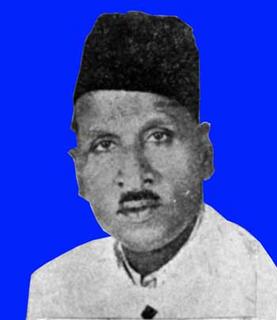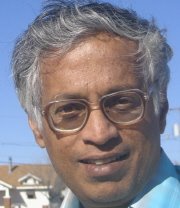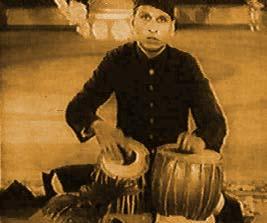Ahmad Jan Thirakwa, Tabla wizard
 The tabla wizard
The tabla wizardEven in the prime of one’s youth, Tabla-playing requires stamina and endurance. Ustad Ahmad Jan Thirakwa (1878-1976) defied age and continued to perform solo recitals till the end of his long life. No wonder Palghat Mani Iyer, the great mridangam artist described Thirakwa the reincarnation of Saraswati.
Hailing from
Ahmed Jan soon became the favourite disciple of Munir Khan. His fingers on the tabla resembled the feet of a kathak dancer and soon he was called “Thirakwa”. His playing represents the Laliyana style of the Farukhabad gharana to which tabla players like Amir Hussain (nephew of Munir Khan), Nizamuddin Khan, Ghulam Hussain, Shamsuddin and others belong.
After his debut to thunderous ovation at Khetwadi, in
A popular and frequent performer on the radio, Thirakwa was constantly in demand at various music conferences all over the country. Though a solo tabla artist, he accompanied maestros like Allahbande Khan, Rajab Ali Khan, Alladiya Khan, Wahid Khan, Allauddin Khan, Bhaskarbuwa Bakhle, Faiyaz Khan, Mushtaq Hussain, Hafiz Ali, Ali Akbar, Bismillah Khan, Begum Akhtar and others. His favourite was Faiyaz Khan. The admiration was mutual as Ustad Faiyaz Khan used to say of other accompanists "Na huva Thirakwa" (Thirakwa is irreplaceable).
Proficient in all the styles of tabla including his favourites Delhi, Farukkabadi as also Poorab and Ajrada, Thirakwa epitomised success due to correct and sincere training, long and continuous years of practice, regular physical exercises, and nourishing food. His fame resulted from his authority on music as well as his dignified and accommodating nature. Thirakwa’s popularity never waned since he practised rigorously, maintaining his unmatched mastery even after he crossed ninety. Although his voice in normal conversation grew shaky with age, he could recite complicated and jaw-breaking tabla-bols and parans with steadiness and strength. His disciples include Lalji Gokhkale, Prem Vallabh, Ghulam Ahmad, Chhote Gokhale, Nikhil Ghosh, Ahmad Ali, Ram Kumar Sharma and others. Honours like the Padma Bhushan came to him naturally. With a wealth of reminiscences and a good sense of humour, Thirakwa could imitate many vocalists as he recounted interesting episodes and anecdotes about the colourful events of the past. He wore black achkan and cap and would appear with blackened moustache, surma-lined eyes and a silver-capped walking stick. His death in



1 Comments:
Thank you for posting such a nice blog, If you want to learn music with professionals you can search music classes lucknow
Post a Comment
<< Home